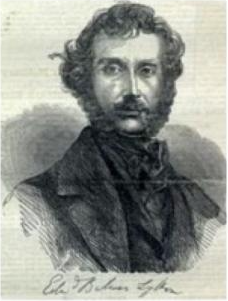Ada and the Lytton Family
An interesting footnote to Ada’s story is her friendship with the novelist, poet, and playwright Edward Bulwer Lytton (whose much quoted lines, ‘Beneath the rule of men entirely great/The pen is mightier than the sword’ are often distorted by truncation).

Some of Ada’s letters to Bulwer Lytton survive and are currently held at HALS (Hertfordshire Archives and Local Studies, D/EK/C3/12-18). They reveal a lively discussion of religion and immortality, and some evidence of sharp disagreement. In one Ada writes
“I think I have been much better occupied than I should have been at Church , where if I had heard anything I had suspected might be a truth (for a moment), I should have rubbed my eyes to ascertain if I was dreaming”
following that a few days later with
” … I once felt as sure of futurity as you do , but I have seen (as I believe) my error , & am too honest with myself to cling to a phantom however lovely. In fact I am religiously sceptical, and conscientiously unbelieving.”
Nonetheless he thought her a suitable candidate to be a companion to his precocious daughter Emily. Henry Lytton Cobbold and Mary Letitia Greene tell the story in In the bosom of her father: the life and death of Emily Bulwer Lyttton (39 Production Company, 2017).

In two letters to Emily written in June 1847, and now held in the Knebworth House archives, Bulwer Lytton paints a fascinating portrait of Ada, perhaps one more revealing of his character than of hers:
“She is Byron’s daughter you know & thought very clever. She is very friendly to me & I think may visit us in the Summer. She is handsome to my eyes, more from a rude likeness to her father, & my associations of sorrowful love for that great creature, than in herself. Her manner is not good – but she has “the womanly charm” nonetheless … [later] I have seen more of Lady Lovelace. She is a very remarkable person, extremely original – but too prononcée for my taste, womanly in mienne, but masculine in mind …. [later] Neither need you fear for Lady Lovelace’s disastrous influences – she interests me as a mind, not as a woman, & indeed I am even thinking she might be a good friend for you … For the rest, she is not dark – we communicate on the most abstract of metaphysical questions, the source of ideas, the destinies of life, the nature of the soul. And in all these we fight gallantly against each other.”
Edward Bulwer Lytton’s grandson Neville Lytton married Ada’s granddaughter Judith Blunt in 1899. It is as a result of this connection that the Lovelace Byron Papers deposited in the Bodleian Library came into the possesion of Ada’s Lytton family descendants.